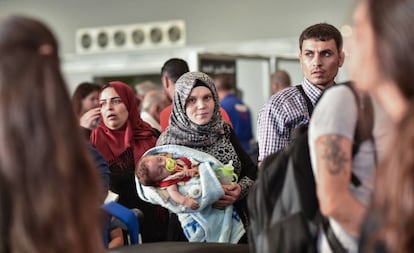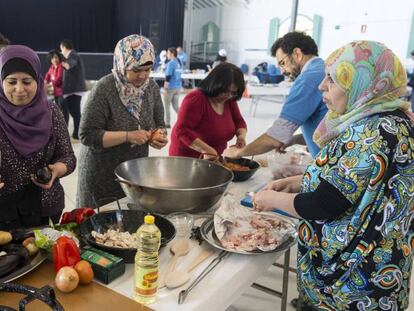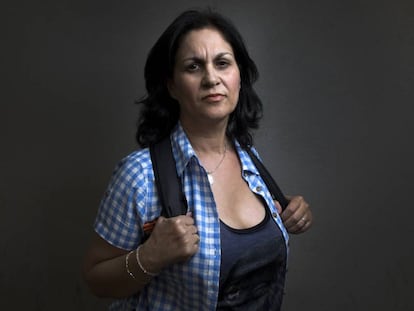The Al Saids¡¯ journey from Syria to a new life in Spain
EL PA?S accompanied a Syrian family as they waited in Beirut before boarding a flight to Madrid

¡°This is a change for the better, inshalla [God willing],¡± repeats 22-year-old Duaa Al Said, as though to convince herself, as she rocks her two-month-old baby in her arms. Her husband Aqba, 30, hugs her shoulder while keeping an eye on their two other children: Mohammed, aged four, and Amina, two.

Just a few hours later, the family boarded a plane for the first time in their lives and landed in Spain on Thursday, joining 199 other Syrian refugees living here. In total, the Spanish government has taken in 1,742 international protection seekers out of the 17,337 that were negotiated two years ago in Brussels. That is barely 9.9% of the total. And the deadline expires on September 26.
But before taking their flight, the Al Saids spent the night in the company of around a dozen people, including relatives and neighbors from the impoverished neighborhood of Uzai, in the outskirts of southern Beirut. In the early morning hours before their scheduled flight time, the adults sat on plastic mats, smoked and sipped coffee as they recalled life in Syria in the old days. Around 15 children lay asleep here and there, emitting a chorus of snores. Everyone was out in the open, as the heat and humidity were staggering and there was no electricity to power fans.
I have two brothers in Turkey, and of the two who were here, one of them is leaving. Our family is breaking up
Sausa, sister to Aqba Al-Said
¡°Yesterday we left our apartment and came to my brother¡¯s rented house,¡± said Aqba, as his nephews helped him weigh the two 20-kilogram suitcases and two 5kg backpacks that the International Organization for Migration (IOM) told them they could take with them. Some clothes, a handful of photographs and a pack of diapers: that is all they would be able to keep from their previous life. There were no toys in the luggage.
When a plane flew overhead, the interviewer suddenly became the interviewee.
- Will we be able to take milk on the plane? And diapers? asked Duaa nervously.
- Do they accept women with veils in Spain, or are they forced to remove them? added Sausa, who is Aqba¡¯s sister.
Tension in Lebanon
The same country that let in the Al Said family seven years ago, along with another 1.5 million refugees from Syria (a quarter of the population), says it cannot take the pressure anymore. This week, Lebanese lawmakers held a heated debate over a plan to return the refugees to their home country. The UN sees the move as premature, and so far only 850 refugees have agreed to voluntarily go home.
Relations between Syrians and Lebanese are increasingly strained in a country with deficient infrastructure and soaring unemployment. The tension climaxed on June 30, when four of 350 Syrian refugees who had been arrested by the police died in custody. Suspicion that they were tortured unleashed a war on social media between Syrian activists and supporters of the Lebanese army.
- Are there jobs in Spain? Is it difficult to learn Spanish? joined in Mazen, Aqba¡¯s older brother.
The questions flew before an answer could be provided. But the joy of knowing that they are part of the privileged few who will be able to start afresh in a country with schools and hospitals (¡°just like in prewar Syria,¡± noted Mazen) was tempered by the fear of the unknown. A day before flying, the family did not yet know which city they would live in.
The separation from friends and relatives was also hard in a culture where families tend to live in the same neighborhood and their members see each other on a daily basis.
¡°Once we travel to Spain, we cannot return to Lebanon for the next five years, those are the rules set by the Lebanese government,¡± explained Duaa, who has not seen her own parents for six years. They live in the Syrian province of Idlib.
Meanwhile, baby Zeid slept unconcerned about his future. He had not even been born when his parents were informed that they had been selected by the United Nations Refugee Agency (UNHCR) for resettlement in Spain.
¡°We left [Syria] at the very beginning, in August 2011. Three siblings went to Lebanon and two moved to Istanbul with our parents,¡± said Aqba, showing his smartphone screen to reveal some of the latter waving hello from Turkey via a Skype video conference. Aqba was not able to attend his father¡¯s funeral.
The numbers
Forecast. According to the Spanish executive, by September 2017 a total of 1,010 Syrian refugees in Lebanon will resettle in Spain. Of these, 286 already arrived last summer; 375 are landing in Madrid this month, and another group of 350 will come in September.
Conflict. The war in Syria has already claimed 331,000 lives (a third of them civilians), left over one million injured and displaced over half of Syria's population of 23 million from their homes.
¡°The situation quickly deteriorated in the first few months, there was a lot of violence and crime, so we decided to move to Lebanon and find jobs here. I tried to work as a taxi driver, but we Syrians get stopped at every military checkpoint. Now I fear we might start getting sent back to Syria. So we are stuck in limbo,¡± added Aqba.
It is 4.30am and in half and hour the Al Saids have to be at a meeting point to board the bus that will take them to Beirut airport. The tears begin to flow as Mazen starts the van that will take the family to the agreed spot. Once there, they join other teary, scared-looking refugees. Some IOM employees take their documents and tag their luggage. Everyone embraces, aware that it will be years before they see each other in person again.
¡°I have two brothers in Turkey, and of the two who were here, one of them is leaving. Our family is breaking up,¡± grumbles Sausa, rubbing her eyes.
Slowly, the buses roll away on their way to the airport. A while later, dozens of Syrian refugees clutching their passports stand in line to go through the police check. Duaa gestures goodbye with her head as she whispers: ¡°This is a change for the better, inshalla.¡±
English version by Susana Urra.
Tu suscripci¨®n se est¨¢ usando en otro dispositivo
?Quieres a?adir otro usuario a tu suscripci¨®n?
Si contin¨²as leyendo en este dispositivo, no se podr¨¢ leer en el otro.
FlechaTu suscripci¨®n se est¨¢ usando en otro dispositivo y solo puedes acceder a EL PA?S desde un dispositivo a la vez.
Si quieres compartir tu cuenta, cambia tu suscripci¨®n a la modalidad Premium, as¨ª podr¨¢s a?adir otro usuario. Cada uno acceder¨¢ con su propia cuenta de email, lo que os permitir¨¢ personalizar vuestra experiencia en EL PA?S.
?Tienes una suscripci¨®n de empresa? Accede aqu¨ª para contratar m¨¢s cuentas.
En el caso de no saber qui¨¦n est¨¢ usando tu cuenta, te recomendamos cambiar tu contrase?a aqu¨ª.
Si decides continuar compartiendo tu cuenta, este mensaje se mostrar¨¢ en tu dispositivo y en el de la otra persona que est¨¢ usando tu cuenta de forma indefinida, afectando a tu experiencia de lectura. Puedes consultar aqu¨ª los t¨¦rminos y condiciones de la suscripci¨®n digital.










































